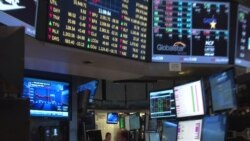China allowed the value of its currency to drop again Wednesday, prompting a second consecutive decline in some major stock markets around the world. There were lots of surprised faces at the New York Stock Exchange.
Wall Street and the NYSE appeared stunned by the sudden action of the Chinese government. The floor of the exchange was humming and number one on the mind of traders and investors was the devaluation.
U.S. stocks initially declined, but recovered most of their losses by the end of Wednesday trading.
A weaker currency could boost China’s economic growth by making Chinese-made exports less expensive for foreign buyers. Investors may be worried this intervention signals that growth in the world’s second-largest economy is slowing more than they first thought.
China's central bank strictly controls the currency, and says the move is meant to give the market a greater role in determining the value of the yuan.
'Reserve' currency
In a VOA interview, Peterson Institute scholar Nicholas Lardy said the change gives Beijing more flexibility in managing the economy. He said the change also improves the chances China’s currency will play a larger role in international commerce.
Duke University business professor Campbell Harvey said China wants the yuan to eventually become a “reserve” currency like the dollar and the euro. He said such currencies must be driven by market forces.
Beijing’s change in currency exchange policy brought criticism from several members of the U.S. Congress who say it continues a practice that gives Chinese exporters an unfair advantage, and hurts American jobs.
Exchange rates are among many issues likely to be on the agenda for September’s planned visit to Washington by China’s President Xi Jinping.
Tim Anderson, the managing director at MND Partners, said, “It was clearly not anticipated by the market, that’s why we’ve gotten a sharp move that we’ve had for the downside the last couple of days. The hardest hit stocks have been the exporters to China. Clearly, the automobile companies, some of the heavy equipment companies, have been particularly hard hit mainly on a currency effect.
Devaluations, inflation, deflation
The issue of copy-cat devaluations and inflation versus deflation was on the mind of Peter Costa, a broker and president of Empire Executions.
“With the yuan being devalued you’re not going to see any inflation in any currency or any economy across the globe. The other fear is that other emerging markets will do the same thing to keep current on what’s going on with China," said Costa.
"That’s a worrisome thing. I think that will be much more deflationary if you start seeing Vietnam, Thailand, a lot of these other Far East nations cutting their value of their currencies. It could be disastrous," he said.
For sure, there is unease, uncertainty and anticipation about what may be next for economies around the world.





